 W
WAmazon DynamoDB is a fully managed proprietary NoSQL database service that supports key-value and document data structures and is offered by Amazon.com as part of the Amazon Web Services portfolio. DynamoDB exposes a similar data model to and derives its name from Dynamo, but has a different underlying implementation. Dynamo had a multi-leader design requiring the client to resolve version conflicts and DynamoDB uses synchronous replication across multiple data centers for high durability and availability. DynamoDB was announced by Amazon CTO Werner Vogels on January 18, 2012, and is presented as an evolution of Amazon SimpleDB solution.
 W
WAmazon Elastic Block Store (EBS) provides raw block-level storage that can be attached to Amazon EC2 instances and is used by Amazon Relational Database Service (RDS).
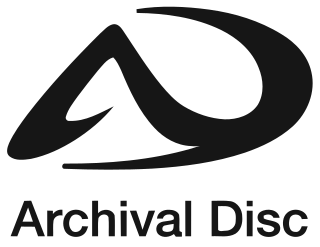 W
WArchival Disc (AD) is the name of a trademark owned by Sony Corporation and Panasonic Corporation describing an optical disc storage medium designed for long-term digital storage. First announced on 10 March 2014 and introduced in the second quarter of 2015, the discs are intended to be able to withstand changes in temperature and humidity, in addition to dust and water, ensuring that the disc is readable for at least 50 years. The agreement between Sony and Panasonic to jointly develop the next generation optical media standard was first announced on 29 July 2013.
 W
WBaidu Wangpan is a Cloud service provided by Baidu, Inc., headquartered in Haidian District in Beijing. It offers a cloud storage service, client software, file management, resources sharing, and Third Party Integration. After being created on one client terminal, files can be synchronized automatically on other internet-connected client terminals. It was launched as Baidu WangPan on 23 March 2012. On 22 August 2013, an offer of permanent free 2 Terabytes storage for users was announced.
 W
WBOSH is an open-source software project that offers a toolchain for release engineering, software deployment and application lifecycle management of large-scale distributed services. The toolchain is made up of a server and a command line tool. BOSH is typically used to package, deploy and manage cloud software. While BOSH was initially developed by VMware in 2010 to deploy Cloud Foundry PaaS, it can be used to deploy other software. BOSH is designed to manage the whole lifecycle of large distributed systems.
 W
WCloud Foundry is an open source, multi-cloud application platform as a service (PaaS) governed by the Cloud Foundry Foundation, a 501(c)(6) organization.
 W
WCloudBees is a provider of continuous delivery software services. Initially, CloudBees provided a platform as a service (PaaS) to build, run, and manage web applications. CloudBees supported the entire application life-cycle from development to deployment. Sacha Labourey founded the company in early 2010, and investors include Matrix Partners, Lightspeed Venture Partners and Verizon Ventures. CloudBees is headquartered in San Jose, CA with additional offices in Lewes, DE, Richmond, VA, Brussels, Belgium, Seville, Spain and Neuchâtel, Switzerland.
 W
WA content delivery network, or content distribution network (CDN), is a geographically distributed network of proxy servers and their data centers. The goal is to provide high availability and performance by distributing the service spatially relative to end users. CDNs came into existence in the late 1990s as a means for alleviating the performance bottlenecks of the Internet, even as the Internet was starting to become a mission-critical medium for people and enterprises. Since then, CDNs have grown to serve a large portion of the Internet content today, including web objects, downloadable objects, applications, live streaming media, on-demand streaming media, and social media sites.
 W
WCTERA Networks is a privately held enterprise software company headquartered in New York and Israel. The company has regional offices in the UK, Italy, France, Spain, Germany, and Australia. CTERA has partnered with companies including Amazon Web Services, Hewlett Packard Enterprise, IBM, and Cisco. Clients include Deutsche Telekom, Banco Santander, Axa and the United States Department of Defense. In October 2016 IBM became a CTERA reseller. IBM's Cloud Object Storage, integrated with the CTERA Enterprise File Services Platform, can be deployed on-premises, in the cloud or in a hybrid on-premises/cloud setup. CTERA was mentioned in Gartner's 2016 Magic Quadrant for Data Center Backup and Recovery Software, as well as Gartner's 2017 and 2018 Magic Quadrant for Content Collaboration Platforms.
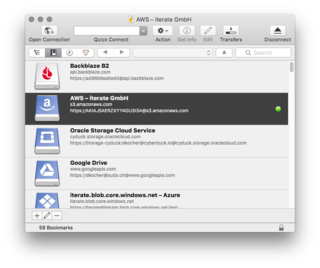 W
WCyberduck is an open-source client for FTP and SFTP, WebDAV, and cloud storage, available for macOS and Windows licensed under the GPL. Cyberduck is written in Java and C# using the Cocoa user interface framework on macOS and Windows Forms on Windows. It supports FTP/TLS, using AUTH TLS as well as directory synchronization. The user interacts with the user interface (GUI), including file transfer by drag and drop and notifications via Growl. It is also able to open some files in external text editors.
 W
WA data center or data centre is a building, dedicated space within a building, or a group of buildings used to house computer systems and associated components, such as telecommunications and storage systems.
 W
WDigitalOcean, Inc. is an American cloud infrastructure provider headquartered in New York City with data centers worldwide. DigitalOcean provides developers cloud services that help to deploy and scale applications that run simultaneously on multiple computers. As of December 2020, DigitalOcean was the third-largest hosting company in the world in terms of web-facing computers.
 W
WDiino is a cloud storage provider, offering online backup data storage and file sharing. The company, Diino Systems AB, was founded 2004 and is based Stockholm, Sweden, with sales offices in Atlanta, London and Mexico City. Its owners include Swisscom.
 W
WDrop.io was an online file sharing service. It allowed users to quickly create "drops", which could contain files of any type, and could be accessed via the internet, e-mail, phone, fax, and widgets. The service did not require users to sign up for an account, and each drop was private unless the creator chose to share it. Drop.io was named one of TIME Magazine's 50 Best Websites of 2009, and CNET Webware 100.
 W
WElephantDrive is a storage virtualization service used primarily as an online backup tool, but also as a remote access service/collaboration tool. The service runs on both Windows and Mac platforms, and allows users to create simple automated rules for protecting data by moving it into an ElephantDrive account.
 W
WEtherDrive is a brand name for storage area network devices based upon the ATA over Ethernet (AoE) protocol. It was registered with the United States Patent and Trademark Office in 2004. The word was invented by Brantley Coile as a portmanteau of the words Ethernet and disk drive. EtherDrive was a trademark by Coraid from 2002 until 2015 when it was purchased by The Brantley Coile Company as part of the purchase of Coraid's software copyrights, trademarks and trade secrets in May 2015.
 W
WGoogle Drive is a file storage and synchronization service developed by Google. Launched on April 24, 2012, Google Drive allows users to store files on their servers, synchronize files across devices, and share files. In addition to a website, Google Drive offers apps with offline capabilities for Windows and macOS computers, and Android and iOS smartphones and tablets. Google Drive encompasses Google Docs, Google Sheets, and Google Slides, which are a part of the Google Docs office suite that permits collaborative editing of documents, spreadsheets, presentations, drawings, forms, and more. Files created and edited through the Google Docs suite are saved in Google Drive.
 W
WGreenButton was a New Zealand-based software firm. The company specialized in moving independent software vendors (ISVs) and enterprises to cloud computing. Founded in 2006, GreenButton was based in Wellington, New Zealand, with additional offices in Palo Alto, California and Seattle. GreenButton was acquired by Microsoft on 2 May 2014; its technologies were integrated into its Azure service.
 W
WHeroku is a cloud platform as a service (PaaS) supporting several programming languages. One of the first cloud platforms, Heroku has been in development since June 2007, when it supported only the Ruby programming language, but now supports Java, Node.js, Scala, Clojure, Python, PHP, and Go. For this reason, Heroku is said to be a polyglot platform as it has features for a developer to build, run and scale applications in a similar manner across most languages. Heroku was acquired by Salesforce.com in 2010 for $212 million.
 W
WHP Cloud was a set of cloud computing services available from Hewlett-Packard (HP) that offered public cloud, private cloud, hybrid cloud, managed private cloud, and other cloud services. It was the combination of the previous HP Converged Cloud business unit and HP Cloud Services, which is the OpenStack technology-based public cloud. It is used by enterprise organizations so they can combine public cloud services with their own internal IT resources to create hybrid clouds, or a mix of different cloud computing environments made up of private and public clouds.
 W
Wi-drive was a file hosting service that operated from 1998—2002.
 W
WIASO Backup is a hybrid-cloud backup software created by IASO, a Dutch backup technology company developing cloud backup solutions for service providers targeting SMBs and enterprises.
 W
WiCloud is a cloud storage and cloud computing service from Apple Inc. launched on October 12, 2011. As of 2018, the service had an estimated 850 million users, up from 782 million users in 2016.
 W
Wiland Internet Solutions provides hosted cloud infrastructure as a service for production business applications, disaster recovery and business continuity, testing and development, and software as a service enablement for independent software vendors. iland also provides traditional colocation and hybrid cloud solutions. Founded in 1995, iland provides its services from high availability hubs specifically designed for cloud infrastructure in Boston, Washington D.C., Houston, Los Angeles, Dallas, Manchester, London, Amsterdam, Singapore, Melbourne, and Sydney. iland is a Premier-level partner in the VMware Service Provider Program (VSPP).
 W
WAn Internet Protocol camera, or IP camera, is a type of digital video camera that receives control data and sends image data via an IP network. They are commonly used for surveillance but unlike analog closed-circuit television (CCTV) cameras, they require no local recording device, only a local area network. Most IP cameras are webcams, but the term IP camera or netcam usually applies only to those that can be directly accessed over a network connection, usually used for surveillance.
 W
WKubity is a cloud-based 3D communication tool that works on desktop computers, the web, smartphones, tablets, augmented reality gear, and virtual reality glasses. Kubity is powered by several proprietary 3D processing engines including "Paragone" and "Etna" that prepare the 3D file for transfer over mobile devices.
 W
WThe Linkup, a spin-off from Streamload, was a "social network for file sharing" and a service that let users send, receive, and store large amounts of data via the web. It was one of the first Internet based storage services and is now one of the largest failures resulting in user data loss.
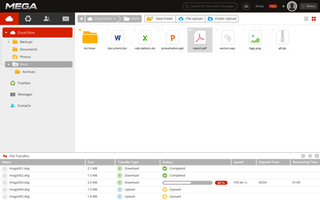 W
WMega or Mega.nz is a cloud storage and file hosting service offered by Mega Limited, an Auckland-based company. The service is offered primarily through web-based apps. Mega mobile apps are also available for Android and iOS. Mega was known for its large 50 GB storage allocation for free accounts, but now offers 15 GB for free accounts.
 W
WMicrosoft OneDrive is a file hosting service and synchronization service operated by Microsoft as part of its web version of Office. First launched in August 2007, OneDrive allows users to store files and personal data like Windows settings or BitLocker recovery keys in the cloud, share files, and sync files across Android, Windows Phone, and iOS mobile devices, Windows and macOS computers, and the Xbox 360 and Xbox One consoles. Users can upload Microsoft Office documents to OneDrive.
 W
WNextcloud is a suite of client-server software for creating and using file hosting services. Nextcloud is free and open-source, which means that anyone is allowed to install and operate it on their own private server devices.
 W
WNimbus Note is a note-taking app designed by Nimbus Web company in Cleveland, Ohio. The app is cross-platform, for Android, iOS, macOS, and Microsoft Windows.
 W
WNorton Zone was a cloud file sharing and online backup tool service operated by Symantec that can be used to share, sync, access, store, and backup data. It also allows for file collaboration with commenting. Norton Zone is accessible through apps for Windows, Windows RT, Android, Mac, and iOS platforms. Norton Zone uses encrypted and replicated cloud storage and provides client-side encryption.
 W
WThe Open Compute Project (OCP) is an organization that shares designs of data center products and best practices among companies, including Facebook, IBM, Intel, Nokia, Google, Microsoft, Seagate Technology, Dell, Rackspace, Cisco, Goldman Sachs, Fidelity, Lenovo and Alibaba Group.
 W
WOpenIO has been founded in 2015 by Laurent Denel (CEO), Jean-François Smigielski (CTO) and five other co-founders, to offer an object storage solution for building hyper-scalable IT infrastructures for a wide range of applications. They have leveraged open source software, developed since 2006, which is based on a grid technology that enables dynamic behaviors and supports heterogenous hardware. In October 2017 OpenIO completed a $5 million funding round. In July 2020 OpenIO has been acquired by OVH.
 W
WOpenShift is a family of containerization software products developed by Red Hat. Its flagship product is the OpenShift Container Platform — an on-premises platform as a service built around Docker containers orchestrated and managed by Kubernetes on a foundation of Red Hat Enterprise Linux. The family's other products provide this platform through different environments: OKD serves as the community-driven upstream, OpenShift Online is the platform offered as software as a service, and Openshift Dedicated is the platform offered as a managed service.
 W
WOvi by Nokia was the brand for Nokia's Internet services. The Ovi services could be used from a mobile device, computer or via the web. Nokia focused on five key service areas: Games, Maps, Media, Messaging and Music. Nokia's aim with Ovi was to include third party developers, such as operators and third-party services like Yahoo's Flickr photo site. With the announcement of Ovi Maps Player API, Nokia started to evolve their services into a platform, enabling third parties to make use of Nokia's Ovi services.
 W
WownCloud is a suite of client–server software for creating and using file hosting services. ownCloud functionally has similarities to the widely used Dropbox. The primary functional difference between ownCloud and Dropbox is that ownCloud does not offer data centre capacity to host stored files. The Server Edition of ownCloud is free and open-source, thereby allowing anyone to install and operate it without charge on their own private server.
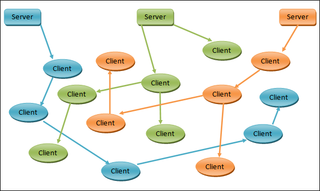 W
WP2PTV refers to peer-to-peer (P2P) software applications designed to redistribute video streams in real time on a P2P network; the distributed video streams are typically TV channels from all over the world but may also come from other sources. The draw to these applications is significant because they have the potential to make any TV channel globally available by any individual feeding the stream into the network where each peer joining to watch the video is a relay to other peer viewers, allowing a scalable distribution among a large audience with no incremental cost for the source.
 W
WPanzura is a privately owned company providing a global file system for enterprises storing data in the cloud. Based in Campbell, California, Panzura has satellite offices across the USA, and in the UK and New Zealand.
 W
WPDFVue is an online PDF viewer and editor that is in beta release. Features include viewing, commenting, annotations, page deletion or rotation and adding fillable form fields to PDFs. Supported browsers include Internet Explorer, Firefox, and Safari. PDFs can be uploaded directly, or imported from a web address. The Firefox extension redirects PDFs, enabling viewing and annotation within the browser.
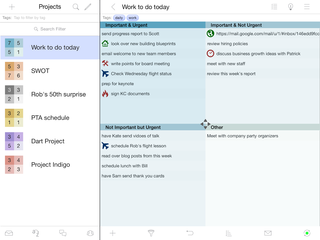 W
WPriority Matrix is a time management software application that is supported on a number of platforms, including Microsoft Windows, Mac OS X, Android, and iOS. It is based on the Eisenhower Method of arranging tasks by urgency and importance in a 2x2 matrix. Priority Matrix offers a cloud-based synchronization of data, allowing for data management across multiple devices. The application is also loosely based on David Allen's Getting Things Done methodology of improving productivity.
 W
WPydio, formerly known as AjaXplorer, is an open-source file-sharing and synchronisation software that runs on the user's own server or in the cloud.
 W
WThe Rackspace Cloud is a set of cloud computing products and services billed on a utility computing basis from the US-based company Rackspace. Offerings include Cloud Storage, virtual private server, load balancers, databases, backup, and monitoring.
 W
WRclone is an open source, multi threaded, command line computer program to manage content on cloud and other high latency storage. Its capabilities include sync, transfer, crypt, cache, union and mount. The rclone website lists fifty supported backends including S3 services and Google Drive.
 W
WSpiderOak is a US-based collaboration tool, online backup and file hosting service that allows users to access, synchronize and share data using a cloud-based server, offered by a company of the same name. Its first offering, its online backup service later branded "SpiderOak ONE", launched in December 2007. SpiderOak is accessible through an app for Windows, Mac and Linux computer platforms, and Android, N900 Maemo and iOS mobile platforms.
 W
WSpoon is an social digital audio live streaming service. It is developed by Spoon Radio Inc., a South Korea-based company with a US-Office located in San Francisco, CA. It allows users to listen to streamers and even start their own live streams using their smartphones.
 W
WStorSimple was a privately held company based in Santa Clara, California, marketing cloud storage.
 W
WStreaming media is multimedia that is constantly received by and presented to an end-user while being delivered by a provider. The verb to stream refers to the process of delivering or obtaining media in this manner. Streaming refers to the delivery method of the medium, rather than the medium itself. Distinguishing delivery method from the media distributed applies specifically to telecommunications networks, as most of the delivery systems are either inherently streaming or inherently non-streaming. There are challenges with streaming content on the Internet. For example, users whose Internet connection lacks sufficient bandwidth may experience stops, lags, or slow buffering of the content. And users lacking compatible hardware or software systems may be unable to stream certain content.
 W
WUbuntu One is an OpenID-based single sign-on service operated by Canonical Ltd. to allow users to log onto many Canonical-owned Web sites. Until April 2014, Ubuntu One was also a file hosting service and music store that allowed users to store data "in the cloud".
 W
WWeTransfer is an internet-based computer file transfer service based in the Netherlands. The company was founded in 2009 in Amsterdam by Rinke Visser, Bas Beerens and Nalden. In October 2018, WeTransfer relaunched its app with the name "Collect by WeTransfer". In May 2020, India banned the WeTransfer app, citing security reasons.
 W
WWindows Live Mesh was a free-to-use Internet-based file synchronization application by Microsoft designed to allow files and folders between two or more computers to be in sync with each other on Windows and Mac OS X computers or the Web via SkyDrive. Windows Live Mesh also enabled remote desktop access via the Internet.
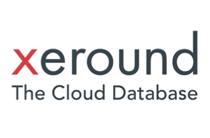 W
WXeround was a provider of cloud database software, launched in 2005, and was shut down in May 2013. The company was founded by Sharon Barkai and Gilad Zlotkin. Zlotkin, a former research fellow at MIT Sloan School of Management, founded five other startups including Radview (NASDAQ:RDVW). Israeli financial newspaper Globes ranked the company as one of Israel's most promising start-ups in 2006.
 W
WZumoDrive is a defunct cloud-based file hosting service operated by Zecter, Inc. On December 22, 2010, Zecter announced its acquisition by Motorola Mobility. The service enabled users to store and sync files online, and also between computers using their HybridCloud storage solution; the latter functionality stopped working in approximately September 2011, while the former was undergoing formal takedown on May 1, 2012. ZumoDrive had a cross-platform client that enabled users to copy any file or folder into the ZumoDrive virtual disk that was then synced to the web and the users' other computers and hand-held devices. Files in the ZumoDrive virtual disk could be shared with other ZumoDrive users or accessed from the web. Users could also upload files manually through a web browser interface. A free ZumoDrive account offered 2 GB of storage, and users could upgrade to paid plans ranging from 10 GB to 500 GB for a monthly subscription fee. The ZumoDrive service was integrated into Yahoo! Mail, allowing users to send or receive any file on their ZumoDrive, and powers HP's recent CloudDrive technology, bundled on all new HP Mini netbooks.